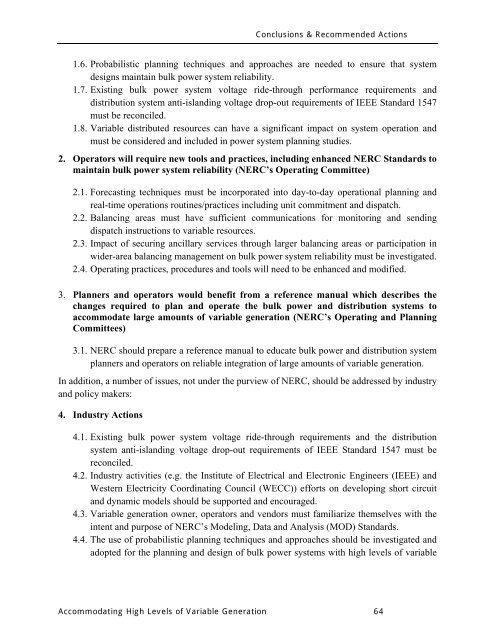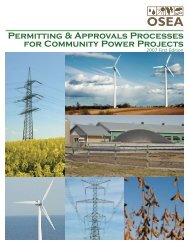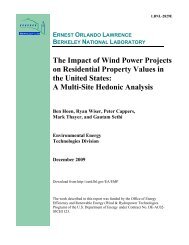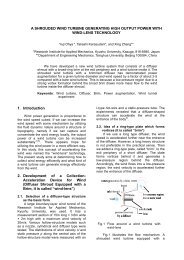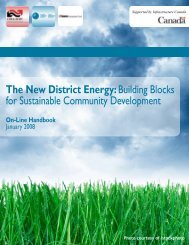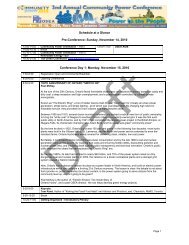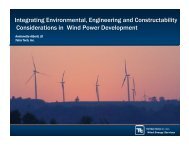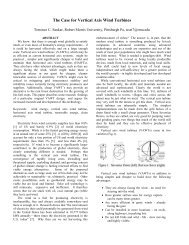Accommodating High Levels of Variable Generation - NERC
Accommodating High Levels of Variable Generation - NERC
Accommodating High Levels of Variable Generation - NERC
You also want an ePaper? Increase the reach of your titles
YUMPU automatically turns print PDFs into web optimized ePapers that Google loves.
Conclusions & Recommended Actions<br />
1.6. Probabilistic planning techniques and approaches are needed to ensure that system<br />
designs maintain bulk power system reliability.<br />
1.7. Existing bulk power system voltage ride-through performance requirements and<br />
distribution system anti-islanding voltage drop-out requirements <strong>of</strong> IEEE Standard 1547<br />
must be reconciled.<br />
1.8. <strong>Variable</strong> distributed resources can have a significant impact on system operation and<br />
must be considered and included in power system planning studies.<br />
2. Operators will require new tools and practices, including enhanced <strong>NERC</strong> Standards to<br />
maintain bulk power system reliability (<strong>NERC</strong>’s Operating Committee)<br />
2.1. Forecasting techniques must be incorporated into day-to-day operational planning and<br />
real-time operations routines/practices including unit commitment and dispatch.<br />
2.2. Balancing areas must have sufficient communications for monitoring and sending<br />
dispatch instructions to variable resources.<br />
2.3. Impact <strong>of</strong> securing ancillary services through larger balancing areas or participation in<br />
wider-area balancing management on bulk power system reliability must be investigated.<br />
2.4. Operating practices, procedures and tools will need to be enhanced and modified.<br />
3. Planners and operators would benefit from a reference manual which describes the<br />
changes required to plan and operate the bulk power and distribution systems to<br />
accommodate large amounts <strong>of</strong> variable generation (<strong>NERC</strong>’s Operating and Planning<br />
Committees)<br />
3.1. <strong>NERC</strong> should prepare a reference manual to educate bulk power and distribution system<br />
planners and operators on reliable integration <strong>of</strong> large amounts <strong>of</strong> variable generation.<br />
In addition, a number <strong>of</strong> issues, not under the purview <strong>of</strong> <strong>NERC</strong>, should be addressed by industry<br />
and policy makers:<br />
4. Industry Actions<br />
4.1. Existing bulk power system voltage ride-through requirements and the distribution<br />
system anti-islanding voltage drop-out requirements <strong>of</strong> IEEE Standard 1547 must be<br />
reconciled.<br />
4.2. Industry activities (e.g. the Institute <strong>of</strong> Electrical and Electronic Engineers (IEEE) and<br />
Western Electricity Coordinating Council (WECC)) efforts on developing short circuit<br />
and dynamic models should be supported and encouraged.<br />
4.3. <strong>Variable</strong> generation owner, operators and vendors must familiarize themselves with the<br />
intent and purpose <strong>of</strong> <strong>NERC</strong>’s Modeling, Data and Analysis (MOD) Standards.<br />
4.4. The use <strong>of</strong> probabilistic planning techniques and approaches should be investigated and<br />
adopted for the planning and design <strong>of</strong> bulk power systems with high levels <strong>of</strong> variable<br />
<strong>Accommodating</strong> <strong>High</strong> <strong>Levels</strong> <strong>of</strong> <strong>Variable</strong> <strong>Generation</strong> 64


